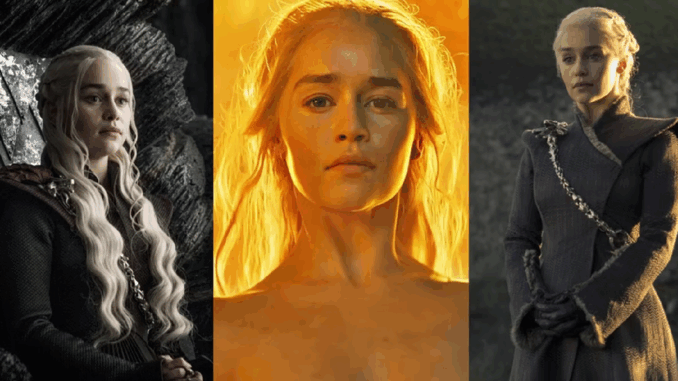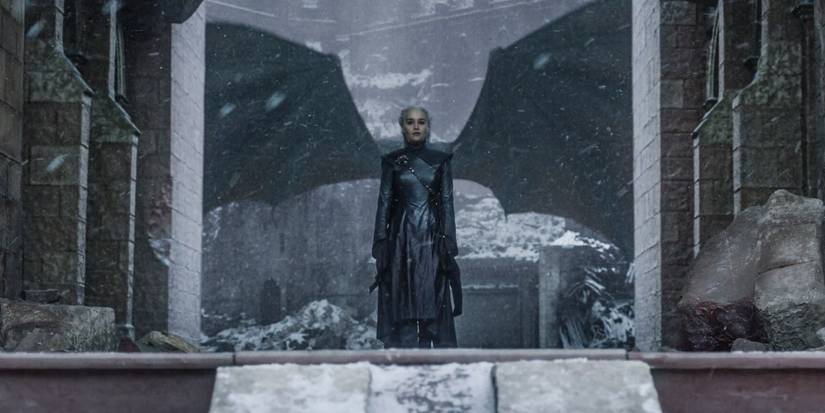
Even compared to the show’s most love-to-hate antagonists, Daenerys is by far the most intimidating at the height of her rage in the series’ final episodes. Every detail, from Daenerys’s chilling rallying speech after destroying King’s Landing to the shot of Drogon’s wings behind her, was iconic. In reality, Daenerys’s villain arc wasn’t rushed or inconsistent with her character. The potential to go bad was written into the Targaryen queen’s character from the beginning and was foreshadowed even in the early and mid-seasons of Game of Thrones.
Daenerys Is a True Targaryen in the Best and Worst Ways
In the House of the Undying in Season 2, Daenerys walks through a half-demolished Iron Throne room, and shortly after, she burns a warlock alive. The hints were there all along, and they were glaring. Throughout Game of Thrones, Daenerys is quick to betray Astapori slave traders and evil warlocks and her actions are completely justified, even if her methods leave something to be desired. Compare this to the death of Shireen Baratheon (Kerry Ingram), who wronged no one. There’s no room for forgiveness when Daenerys has been wronged, and Westeros has wronged her by embracing the usurper Robert Baratheon (Mark Addy) after his war led to the near-extinction of her family line. It isn’t a question of whether Daenerys’s motivations are sound, but if she’s going too far, and the fact that Daenerys is so justified makes her more compelling and believable compared to the series’ heroes and villains alike.
Daenerys Always Had the Potential To Be Good and Bad
In Season 7, when Daenerys unflinchingly kills Randyll Tarly (James Faulkner) and his son for refusing to bend the knee, the precedent was there all along. Daenerys had always led with dragon fire and rarely accepted apologies or compromise. Where Game of Thrones characters like Robb Stark (Richard Madden) and Jon Snow suffer remorse after killing the people who betrayed them, Daenerys never does. Who could forget when Daenerys locked the handmaiden Doreah (Roxanne McKee) who betrayed her and the rich merchant Xaro Xhoan Daxos (Nonso Anozie) in a vault to die? Daenerys always had the potential to be a “villain,” and the realization of her arc in the final seasons delivers, with Daenerys carrying out what her father the “Mad King” Aerys put in motion before her birth.
‘Game of Thrones’ Has a Villain Problem
Many of the villains in Game of Thrones are flat-out evil with very little on-screen motivation. Ramsay Bolton (Iwan Rheon) and Joffrey Baratheon (Jack Gleeson) are a pure evil even the most sympathetic audience can’t justify or seek to understand. Compared to Daenerys, the Game of Thrones just barely scratches the surface of what drives Cersei Lannister (Lena Headey) to be so cruel. This trait of Game of Thrones antagonists is what makes the complex, morally gray antiheroes so interesting. For much of the series, Daenerys was teetering on the morality scale somewhere in the middle. She was killing people in some of the most brutal ways, but they were bad people who deserved it, until her killing turned more indiscriminate. The final seasons inventory the moments that tip Daenerys’s coin towards “madness,” with betrayal after betrayal and the tragic deaths of the dragons she considered her children and her closest friend. Daenerys’s actions after the bells chime out King’s Landing’s surrender is a wakeup call. The signs were there all along, but like the dragon queen’s many adoring followers, we loved her too much to see the warning signs that were there all along.

